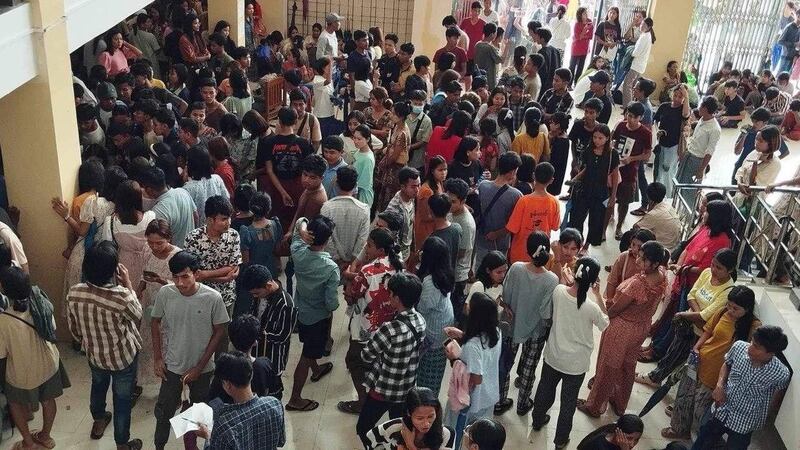Junta soldiers have blocked highways and waterways throughout western Myanmar’s Rakhine state, halting the flow of medicine, fuel and other basic commodities as the regime contends with renewed attacks from the Arakan Army, an ethnic rebel group, several local residents told Radio Free Asia on Monday.
Troops have set up security checkpoints on roads linking towns and villages in both southern and northern Rakhine state, and the drivers of buses and cargo trucks have been stranded on the roadside after being denied access to the Sittwe-Yangon highway.
“They said that the blockade will be lifted only when security returns to normal,” the driver of a passenger bus who requested anonymity for security reasons told RFA. “So, we prepare our meals here.”
The road and waterway closures began on Nov. 13, shortly after the Arakan Army ended a year-old ceasefire when it attacked police outposts and junta convoys in Rathedaung and Minbya townships.
The offensive in Rakhine state coincided with the Arakan Army's participation in Operation 1027 – named after the Oct. 27 start of the military offensive – as part of the "Three Brotherhood Alliance" with two other armed ethnic groups against the military in Shan state in the north.

Roadblocks over the last week have included detailed inspections, residents said. The military has also imposed a curfew between 9 p.m. to 6 a.m. in Sittwe, Rakhine’s state capital.
“No one can travel,” a Sittwe resident told RFA. “People in cities will face more difficulties as all the businesses have stopped.”
‘Strategy to bring misery’
The junta is causing trouble to discourage people from supporting the Arakan Army, according to Rakhine politician Pe Than.
“It’s a strategy to bring misery for people,” he said. “The military is forcing people to blame the [Arakan Army] for the troubles.”
When there were clashes between junta soldiers and the Arakan Army in August 2022, the military regime also blocked access to towns in northern Rakhine, and also arrested civilians, Pe Than said. Several months later, the Arakan Army agreed to a ceasefire, he noted.
RFA called the junta spokesman for Rakhine, Hla Thein, for comment on the blockades, but the calls went unanswered.
Junta spokesman Major Gen. Zaw Min Tun told the Myanma Alin newspaper that the fighting with the Arakan Army has delayed the development of Rakhine state.
RFA tired to contact Arakan Army spokesman Khine Thukha for a response to that remark but was unable to reach him.
In May, Cyclone Mocha devastated much of Rakhine. Hungry and shelterless residents have complained for months of slow or nonexistent aid delivery in the aftermath of the storm.
The U.N. Office for the Coordination of Humanitarian Affairs, or OCHA, said on Friday that most humanitarian activities have been suspended because of “the resurgence of conflict” and “movement restrictions between urban and rural areas.”
More than 26,000 people across nine townships in Rakhine fled from junta artillery attacks last week, OCHA said on Friday.
Translated by Aung Naing. Edited by Matt Reed and Malcolm Foster .
